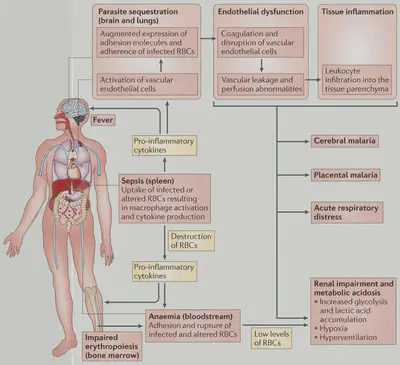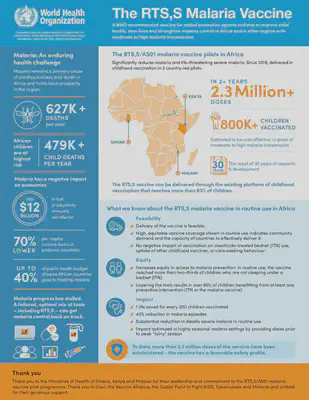Malaria
Malaria is a serious and potentially life-threatening disease caused by parasites belonging to the genus Plasmodium and is transmitted to people through the bites of infected female Anopheles mosquitoes. The parasites enter the human body, multiply, and eventually infect red blood cells. The most common symptoms of malaria include fever, chills, sweats, headache, muscle pain, and fatigue. If left untreated, malaria can cause severe illness or death.
There are several different species of the parasite that can cause malaria, with Plasmodium falciparum being the deadliest. Malaria is most commonly found in tropical and subtropical regions, especially in sub-Saharan Africa, South Asia, and Central and South America. However, the disease can occur in any part of the world where the parasites and the mosquitoes that transmit them are found.
Malaria can be prevented by using mosquito nets, insect repellents, and antimalarial medications. It can also be treated with antimalarial drugs, although some strains of the parasite have become resistant to some of these medications. In addition to treating individual cases, public health efforts to control malaria often involve measures such as insecticide-treated bed nets, indoor spraying of insecticides, and draining standing water where mosquitoes breed.
Life Cycle of Plasmodium spp.

Pathogenesis of Malaria

First Malaria Vaccine Approved by WHO in
October 2021
Malaria Vaccine Implementation Programme / RTS,S infographic

References
CDC. Malaria. Atlanta, GA: US Department of Health and Human Services, CDC; 2020. https://www.cdc.gov/malaria/about/biology/index.html
Gazzinelli, R. T., Kalantari, P., Fitzgerald, K. A., & Golenbock, D. T. (2014, October 17). Innate sensing of malaria parasites. Nature News. Retrieved January 3, 2023, from https://www.nature.com/articles/nri3742
Mbanefo, A., & Kumar, N. (2020). Evaluation of malaria diagnostic methods as a key for successful control and elimination programs. Tropical Medicine and Infectious Disease, 5(2), 102.
Nasir, S. M., Amarasekara, S., Wickremasinghe, R., Fernando, D., & Udagama, P. (2020). Prevention of re-establishment of malaria: historical perspective and future prospects. Malaria journal, 19(1), 1-16.
Talapko, J., Škrlec, I., Alebić, T., Jukić, M., & Včev, A. (2019). Malaria: the past and the present. Microorganisms, 7(6), 179.
World Health Organization. (2021, October 6). WHO recommends groundbreaking malaria vaccine for children at risk. World Health Organization. Retrieved December 30, 2022, from https://www.who.int/news/item/06-10-2021-who-recommends-groundbreaking-malaria-vaccine-for-children-at-risk